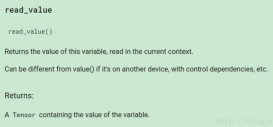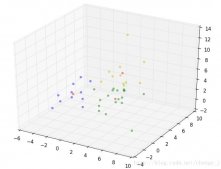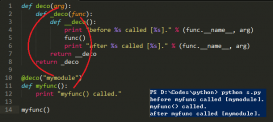我就废话不多说了,大家还是直接看代码吧~
|
1
2
3
4
5
6
7
8
9
10
11
12
13
14
15
16
17
18
19
20
21
22
23
24
25
26
27
28
29
30
|
import tensorflow as tfimport syswith tf.variable_scope('ha'): a1 = tf.get_variable('a', shape=[], dtype=tf.int32) with tf.variable_scope('haha'): a2 = tf.get_variable('a', shape=[], dtype=tf.int32) with tf.variable_scope('hahaha'): a3 = tf.get_variable('a', shape=[], dtype=tf.int32)with tf.variable_scope('ha', reuse=True): # 不会创建新的变量 a4 = tf.get_variable('a', shape=[], dtype=tf.int32) sum = a1 + a2 + a3 + a4fts_s = tf.placeholder(tf.float32, shape=(None, 100), name='fts_s')b = tf.zeros(shape=(tf.shape(fts_s)[0], tf.shape(fts_s)[1]))concat = tf.concat(axis=1, values=[fts_s, b])init_op = tf.global_variables_initializer()with tf.Session() as sess: sess.run(init_op) for var in tf.global_variables(): print var.name import numpy as np ft_sample = np.ones((10, 100)) con_value = sess.run([concat], feed_dict={fts_s: ft_sample}) print con_value[0].shape |
results:
ha/a:0
ha/haha/a:0
ha/haha/hahaha/a:0
(10, 200)
小总结:
1: 对于未知的shape, 最常用的就是batch-size 通常是 None 代替, 那么在代码中需要用到实际数据的batch size的时候应该怎么做呢?
可以传一个tensor类型, tf.shape(Name) 返回一个tensor 类型的数据, 然后取batchsize 所在的维度即可. 这样就能根据具体的数据去获取batch size的大小
2: 对于变量命名, 要善于用 variable_scope 来规范化命名, 以及 reuse 参数可以控制共享变量
补充知识:tensorflow RNN 使用动态的batch_size
在使用tensorflow实现RNN模型时,需要初始化隐藏状态 如下:
如下:
|
1
2
3
|
lstm_cell_1 = [tf.nn.rnn_cell.DropoutWrapper(tf.nn.rnn_cell.BasicLSTMCell(HIDDEN_SIZE),output_keep_prob=dropout_keep_prob) for _ in range(NUM_LAYERS)]cell_1 = tf.nn.rnn_cell.MultiRNNCell(lstm_cell_1)self.init_state_1 = cell_1.zero_state(self.batch_size,tf.float32) |
如果我们直接使用超参数batch_size初始化  在使用模型预测的结果时会很麻烦。我们可以使用动态的batch_size,就是将batch_size作为一个placeholder,在运行时,将batch_size作为输入输入就可以实现根据数据量的大小使用不同的batch_size。
在使用模型预测的结果时会很麻烦。我们可以使用动态的batch_size,就是将batch_size作为一个placeholder,在运行时,将batch_size作为输入输入就可以实现根据数据量的大小使用不同的batch_size。
代码实现如下:
self.batch_size = tf.placeholder(tf.int32,[],name='batch_size')
self.state = cell.zero_state(self.batch_size,tf.float32)
以上这篇tensorflow 动态获取 BatchSzie 的大小实例就是小编分享给大家的全部内容了,希望能给大家一个参考,也希望大家多多支持服务器之家。
原文链接:https://blog.csdn.net/zjm750617105/article/details/82959175












